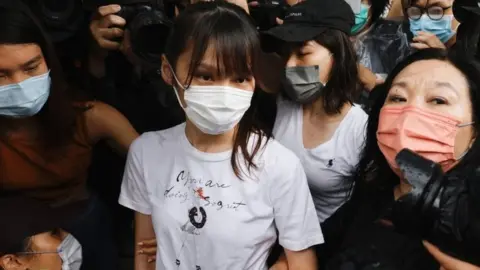Hong Kong activist Agnes Chow released from prison
 Reuters
ReutersHong Kong's prominent pro-democracy activist Agnes Chow has been released from prison after serving nearly seven months of her 10-months term.
She was greeted by supporters and media - but was driven away without making any comments. The authorities did not say why she had been freed early.
Chow and fellow activists Joshua Wong and Ivan Lam were jailed last year for their role in protests in 2019.
China later imposed a national security law to stifle dissent in Hong Kong.
Chow, 24, left the prison gates at about 10:00 local time (02:00 GMT) on Saturday.
Her supporters were heard shouting "Add oil!" - an expression that became a rallying cry during the mass protests.
Chow did not speak to the waiting media, as she was picked in a car by her friends.
Alongside Wong and Lam, also in their 20s, Agnes Chow became the face of Hong Kong's protests. They remain in prison.
Chow's supporters have dubbed her "the real Mulan", in reference to the legendary Chinese heroine who fought to save her family and country. Others have called her the "goddess of democracy".
Nathan Law, another prominent young activist, has been given asylum in the UK after fleeing Hong Kong.
What is the national security law all about?
Hong Kong - a special administrative region of China - was always meant to have a security law, but could never pass one because it was so unpopular.
So this is about the government in Beijing stepping in to ensure the city has a legal framework to deal with what it sees as serious challenges to its authority.
The details of the law's 66 articles were kept secret until after it was passed last year. It criminalises any act of:
- secession - breaking away from the country
- subversion - undermining the power or authority of the central government
- terrorism - using violence or intimidation against people
- collusion with foreign or external forces
The law came into effect at 23:00 local time on 30 June 2020, an hour before the 23rd anniversary of the city's handover to China from British rule.
It gives Beijing powers to shape life in Hong Kong it has never had before. Critics say it effectively curtails protest and freedom of speech - China has said it will return stability.
